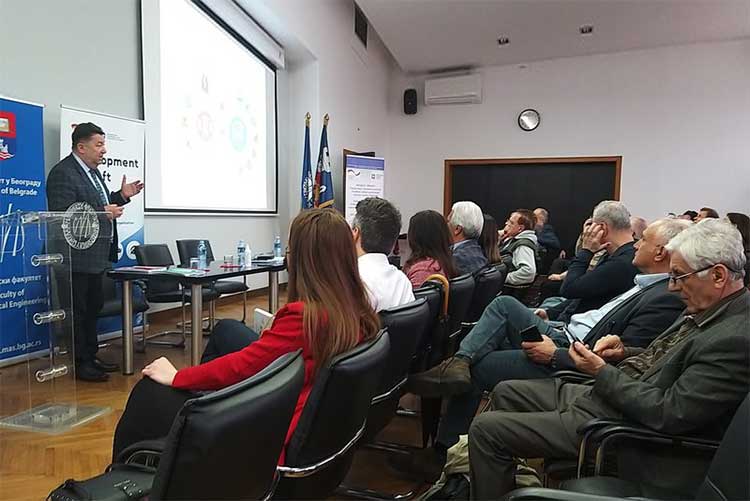The drafting of the Serbian Hydrogen Strategy is a multidisciplinary process and requires the contribution of the entire professional public and the scientific community, it was said at the presentation of the draft Hydrogen Strategy of the Republic of Serbia at the Faculty of Mechanical Engineering, the Serbian Chamber of Commerce (SCC) announced.
The presentation of the draft document opened a dialogue on the possibilities of developing and applying hydrogen technologies in the electric power system, industry, transport, education and other areas of economic and social life.
At the end of 2021, the Ministry of Mining and Energy entrusted the SCC with the task of coordinating the development of a separate strategy for the use of hydrogen in energy and industry, as integral components of the Energy Development Strategy of the Republic of Serbia until 2040, with projections until 2050.
To draft the basic concept of the hydrogen strategy, the SCC hired a consortium gathered around Belgrade University’s Faculty of Mechanical Engineering, with the support of the German Federal Ministry for Cooperation and Development (BMZ) through the German-Serbian Initiative for Sustainable Growth and Employment, under the project Development of the Draft Hydrogen Strategy of the Republic of Serbia and Organization of Round Tables and Promotion.
Mihailo Vesović, Director of the Sector for Strategic Analysis, Services and Internationalization in SCC, especially thanked the Ministry of Mining and Energy, which has recognized the topic of hydrogen as extremely important and entrusted the job to the SCC.
Referring to the current energy crisis, he underlined the importance of developing and applying renewable energy sources, especially ‘green’ hydrogen, which is the main goal of this project.
He emphasized that long-term successful cooperation and partnership with the German Organization for International Cooperation (GIZ) was confirmed on this project.
Dean of the Faculty of Mechanical Engineering Vladimir Popović noted the importance of multidisciplinarity in this topic, which indicates that in addition to directly engaged institutions and individuals in drafting this strategic document, the entire professional and scientific community will be involved.

State Secretary at the Ministry of Mining and Energy Maja Matija Ristić underlined the exceptional importance of the document, especially in the context of finalizing the National Energy Strategy and the Integrated National Energy and Climate Plan together with the need to harmonize the basic concept of the hydrogen strategy with these two strategic documents.
She emphasized the importance of further increasing the share of renewable energy sources in the overall Serbian energy mix, having in view the European Green Agreement and the Green Agenda for the Western Balkans.
Radivoje Mitrović, coordinator of the team for drafting the basic concept of the draft Hydrogen Strategy of Serbia, gave a brief overview of the latest research in technology, production processes and the need to develop professional staff in higher education and science. He gave an overview of the importance of the development and application of hydrogen in the world and in the EU.
He also opened the issue of possibilities and resources for the production, transport, storage and use of hydrogen in industry, energy, agriculture, transport and other fields in Serbia, and mentioned possible risks in terms of the current economic viability of hydrogen production, security aspects, and financial and other challenges of the hydrogen transition.
The discussion was attended by experts working on the document, who discussed the possibilities in energy sources, EU experience in the use of hydrogen in fuel cells for buses, predictions that the share of hydrogen in energy could grow up to 25 percent by 2060, and the interest in industry, where a readiness to be involved in more specific pilot projects was emphasized. It was noted that besides investment costs, special attention should be paid to operating costs for the maintenance of installations.
Finalization of the draft Hydrogen Strategy requires full compliance with the National Energy Strategy and the Integrated National Energy and Climate Plan, the Low Carbon Development Strategy of Serbia with Action Plan, and other important national documents and policies.
Meetings with civil society, promotional events in regional chambers of commerce and more were also announced.
Participants stressed the need to use EU funding programmes and innovative pilot projects to test innovative solutions, build capacity, generate new knowledge and actively join the transition to a green and digital economy.